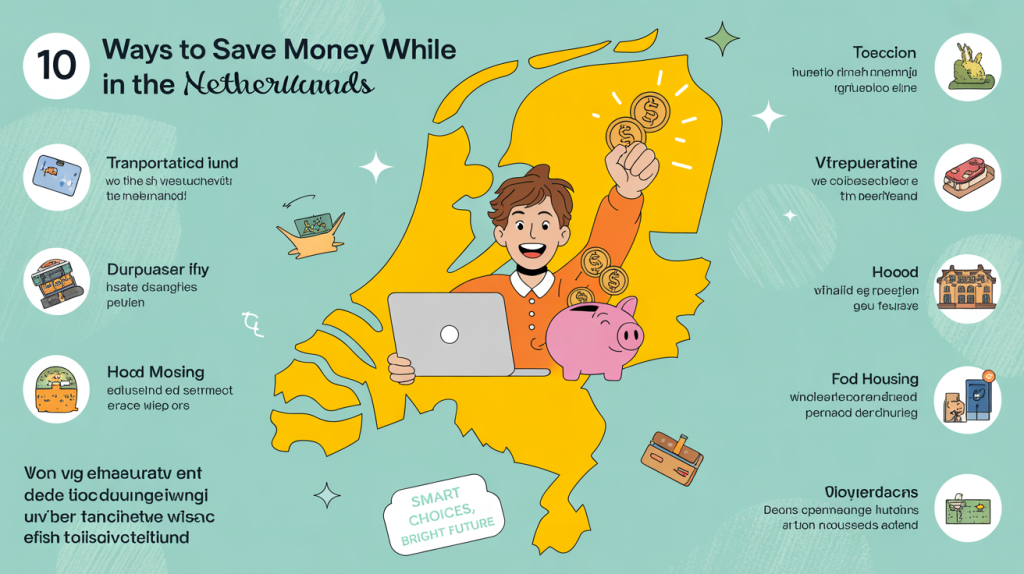Top 10 Ways to Save Money While Studying in the Netherlands: A Comprehensive Guide for International Students
Top 10 Ways to Save Money
Support for Budget-Conscious Students
Conclusion
Take the Next Step
Why Saving Money Matters for Students in the Netherlands
Studying abroad entails multiple expenses, including tuition, accommodation, transport, and daily living costs. By implementing smart financial strategies, students can:
- Reduce dependency on loans or financial aid
- Avoid unnecessary debt
- Improve their overall quality of life
- Focus more on academic and career goals
For university admissions teams and recruitment professionals, understanding these money-saving strategies enables better guidance and support for prospective students, boosting enrolment success and satisfaction rates.
Top 10 Ways to Save Money While Studying in the Netherlands
1. Track Your Monthly Expenses
Keeping a detailed record of monthly expenditures is the foundation of financial discipline. Students should dedicate time weekly or monthly to log expenses, whether rent, groceries, transport, or leisure. This transparency highlights spending patterns and uncovers avoidable costs.
Key benefits of tracking expenses include:
- Identifying non-essential purchases
- Setting realistic spending limits
- Prioritizing funds for necessities
2. Create and Stick to a Student Budget
Developing a comprehensive monthly budget is essential. Begin by listing all estimated expenses: rent, tuition, groceries, transport, study materials, and entertainment. Allocate funds accordingly, ensuring essentials are covered first before discretionary spending.
Tips for an effective budget include:
- Use budgeting templates or apps designed for students
- Review and adjust budgets monthly based on actual spending
- Set aside a contingency fund for unexpected expenses
3. Buy Second-hand Items
The Dutch market has abundant options for purchasing second-hand furniture, bicycles, and textbooks, significantly lowering upfront costs.
Actionable guidance:
- Explore local platforms and student forums for affordable listings
- Attend student markets or community sales events
- Verify product condition to avoid extra repair expenses
4. Shop at Local Street Markets and Discount Stores
Opting for local street markets often means fresher produce at lower prices compared to large supermarket chains. Popular budget supermarkets such as Lidl and Aldi also offer savings on groceries and household essentials.
Shopping tips:
- Plan meals around seasonal and market-available items
- Take advantage of discount days or weekly promotions
- Avoid shopping when hungry to reduce impulse buying
5. Use Student Discounts
Always encouraging students to carry their student ID unlocks various discounts at restaurants, cinemas, museums, and public transport.
Keypoints:
- Many cultural sites offer free or reduced entry for students
- Transport companies provide discounted passes or fares
- Numerous retail outlets have exclusive student promotions
6. Get Subscriptions and Loyalty Cards
Investing in transportation subscriptions—such as monthly or year passes—reduces commuting costs. Additionally, supermarkets and retailers often have loyalty programs that offer points, cashback, or exclusive discounts.
Recommendations:
- Compare prices between different types of transport passes
- Enroll in supermarket loyalty schemes like Bonuskaart for savings
- Monitor expiration dates to maximize benefits
7. Share Housing and Utilities
Shared accommodation is a popular and economical choice. Splitting rent, utilities, and internet bills among roommates can substantially lower living expenses.
Benefits to highlight:
- Access to better quality housing within budget
- Shared responsibility lowers individual financial burden
- Opportunities for social connection and cultural exchange
8. Work Part-time
For students legally permitted by their visa, part-time work offers both financial support and professional experience. Roles in cafes, retail, or campus jobs often accommodate student schedules.
Important considerations:
- Ensure work hours do not interfere with academic commitments
- Understand legal restrictions and employer obligations
- Use earnings to supplement living costs or savings
9. Cycle Instead of Using Public Transport
Cycling is the quintessential Dutch mode of transport—cost-effective, healthy, and flexible. Owning a bike eliminates daily transport fares and reduces commuting time.
Guidance:
- Purchase a second-hand bike to save money
- Invest in proper locks and maintenance to avoid theft or repair costs
- Use cycling routes and apps for safety and navigation
10. Use Budgeting Apps and Tools
Digital tools can streamline money management and deal-hunting. Apps such as ‘Alle Folders en aanbiedingen’ assist students in locating grocery discounts and managing expenses efficiently.
App benefits:
- Reminders and alerts for bills and budgets
- Access to cashback and promotions
- Analytical dashboards for spending insights
How Study in Netherlands Supports Budget-Conscious International Students
At Study in Netherlands, we understand that financial management is vital for international students’ academic success and wellbeing. Our expertise lies in creating education recruitment strategies that aid universities and agencies in delivering tailored advice on cost-saving.
- In-depth informational content on living budgets and cost-saving strategies
- Personalized student consultations addressing financial planning
- Collaboration with universities to provide real-time support on scholarship and housing options
By partnering with Study in Netherlands, recruitment teams and admissions professionals can enhance their service portfolio, attract a well-prepared student body, and improve student satisfaction metrics.
Conclusion
Saving money while studying in the Netherlands is achievable through deliberate planning, smart shopping, and conscious lifestyle choices. Implementing the top 10 ways to save money while studying in the Netherlands can ease financial pressures, allowing students to focus on their academic and personal growth in this vibrant and welcoming country.
For education professionals involved in international recruitment and admissions, understanding these strategies equips you to better support your students’ journey from application to graduation.
Take the Next Step with Study in Netherlands
Ready to enhance your international recruitment approach and provide unparalleled support for students aiming to study in the Netherlands?

